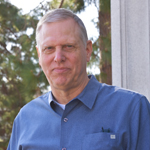 Norman A. Abrahamson, adjunct professor of civil and environmental engineering at the University of California, Berkeley and University of California, Davis, and former engineering seismologist at Pacific Gas & Electric Co, is the 2024 recipient of the Harry Fielding Reid Medal.
Norman A. Abrahamson, adjunct professor of civil and environmental engineering at the University of California, Berkeley and University of California, Davis, and former engineering seismologist at Pacific Gas & Electric Co, is the 2024 recipient of the Harry Fielding Reid Medal.
Abrahamson is recognized as a global leader in the field of probabilistic seismic hazard assessment (PSHA). Within the seismic hazard community, he is known for developing new methodologies as well as refining state-of-the-art practices in ground-motion modeling for crustal and subduction earthquakes; methodologies for assessing and scaling ground-motion time series for engineering applications; validation of 3D simulations; and treatment of uncertainty in PSHA.
Across industry, academia and independent consulting, Abrahamson has offered essential expertise in assessing seismic hazard for nuclear power plants, dams, electric grids and substations, and office buildings, water and gas pipelines, high-speed rail lines, tunnels, and bridges across the world. His contributions have had a significant impact on the National Seismic Hazard Model Project (NSHMP), which integrates information from seismology, geology, geodesy and engineering into the national seismic hazard models for the United States and its territories.
Abrahamson is also recognized for his leadership in a series of Next Generation of Ground-Motion Attenuation Models (NGA) projects, including NGA-West1 and 2, NGASubduction and NGA-East, which established new baselines for seismic hazard assessments in the United States.
Earthquake engineer Ellen M. Rathje, the Janet S. Cockrell Chair at the University of Texas at Austin and Jennie Watson-Lamprey, founder and principal engineering seismologist at Slate Geotechnical Consultants, emphasized Abrahamson’s outstanding contributions to expanding gender diversity in the earthquake engineering field.
“Norm exemplifies what it means to be a mentor. He actively and generously seeks to offer opportunities to young people working around him, even if it means that he passes up opportunities for himself. His main motivation is to expand the number of people working in the field by encouraging smart people and helping them develop their knowledge,” they wrote in their nomination of Abrahamson for the Reid Medal.
In their nomination, Rathje and Watson-Lamprey also showcased numerous comments from women working in seismology and across the sciences who said Abrahamson’s generosity and commitment to inclusion changed the trajectory of their careers. “The group of successful women influenced by Norm will be a lasting legacy of his career,” they noted.
In their commendations of Abrahamson, his colleagues singled out his creative problem-solving abilities and his leadership at the interface of earth science and engineering, where they said he has an exceptional knack for sharing the science of seismology in an accessible form with the engineering community.
Abrahamson has produced over 200 publications, including over 170 refereed journal papers, and nearly a hundred refereed conference papers on earthquake ground motion and seismic hazard. He has received numerous honors and awards throughout his career, including the 2006 William B. Joyner Memorial Lecturer, the 2009 Earthquake Engineering Research Institute (EERI) Distinguished Lecturer, the 2012 Bruce Bolt Medal, the 2023 American Geophysical Union (AGU) Gilbert F. White Distinguished Award and Lecture, and election to the U.S. National Academy of Engineering in 2018. He has served in leadership roles on the boards of director of SSA, EERI, the Pacific Earthquake Engineering Research Center (PEER) and the Consortium of Organizations for Strong Motion Observation Systems (COSMOS).
Abrahamson received his B.A. in geophysics in 1981 and his Ph.D. in geophysics in 1985 from the University of California, Berkeley.
